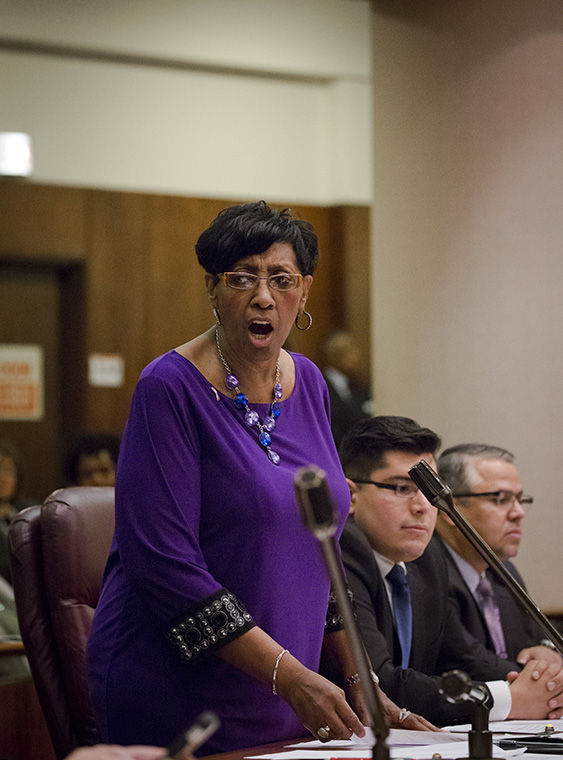Alderman to Chicago: ‘Death or taxes’
Alderman Carrie Austin (34th ward) argued in favor of the budget but admitted that “none of this is easy.”
November 2, 2015
Paychecks in Chicago won’t go quite as far after Jan. 1 following the City Council’s Oct. 28 approval of more than $755 million in new taxes and fees.
The council passed Mayor Rahm Emanuel’s 2016 spending plan, totaling $7.8 billion, by a vote of 36-14.
In a separate vote, the tax plan was approved 35-15. It will raise property taxes by $588 million incrementally by 2019, create a $9.50 monthly garbage collection fee, raise taxi fares by 15 percent and raise the city ride-share fee by 22 cents.
Council members spoke for two hours before voting, most of them urging their colleagues to vote in favor of the monumental plan, during which time Alderman Patrick O’Connor (40th Ward) said the tax increase was the city’s only option to meet its obligations.
“In life, two things are certain: death and taxes,” O’Connor said. “In this instance, for Chicago, it is death or taxes.”
O’Connor referenced claims often made by Emanuel that without the tax increases, the city would be forced to make unsustainable cuts to services like the police and fire departments.
During his first term, Emanuel promised no property tax hikes, but a Springfield-mandated $550 million payment to the city’s long-neglected police and fire pension system is coming due, which prodded Emanuel to change his message, stating the city has “no other choice” but to raise taxes.
The mayor cut Chicago’s structural deficit in half during his first term, lopping off more than $300 million, and indicated in an Oct. 28 interview with ABC7 that he thinks he can eliminate it altogether. Still, some aldermen said the city could have cut more before asking residents to pay up.
“It’s a sad day when we can’t look at cutting our own six-figure salaries or at meaningful [tax incremental financing] reform,” said Alderman Carlos Ramirez-Rosa (35th Ward). “I cannot vote for this budget when so much in
efficiencies was left on the table.”
Alderman Harry Osterman (48th Ward) also said he thinks the city could have made more cuts.
“Are we doing everything in our power to shrink the size of government before we ask homeowners to pay more?” he asked. “I can’t say we have.”
The opposing council members found themselves in the minority. Proponents of the plan were ready to respond at every criticism.
“If there was a dollar to be found, I guarantee we would find it,” said Alderman Carrie Austin (34th Ward), chairman of the Budget and Government Operations Committee.
To ease the burden of the tax hikes, the city will ask the state to expand a tax exemption on homes valued under $250,000 and discount the garbage collection fee for senior citizens.
The expansion of the tax exemption is no guarantee, and some are worried about the plan’s effect on renters as higher taxes on building owners will likely be passed onto tenants, according to groups like the Chicagoland Apartment Association.
In making his final push for the budget to the City Council, Emanuel tried to speak of Chicago’s strengths while reminding aldermen of its challenges.
“The finances of this city hung over [Chicago] like a dark cloud,” he said. “This budget lays a foundation for a stronger future.”








